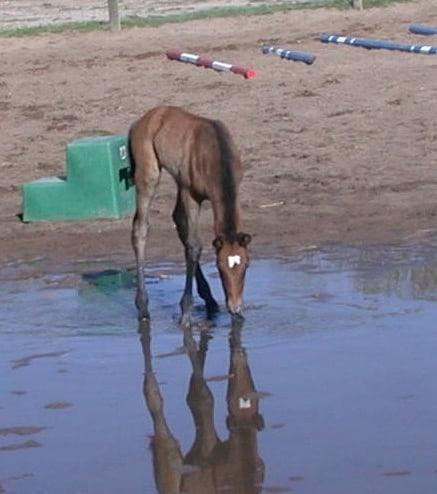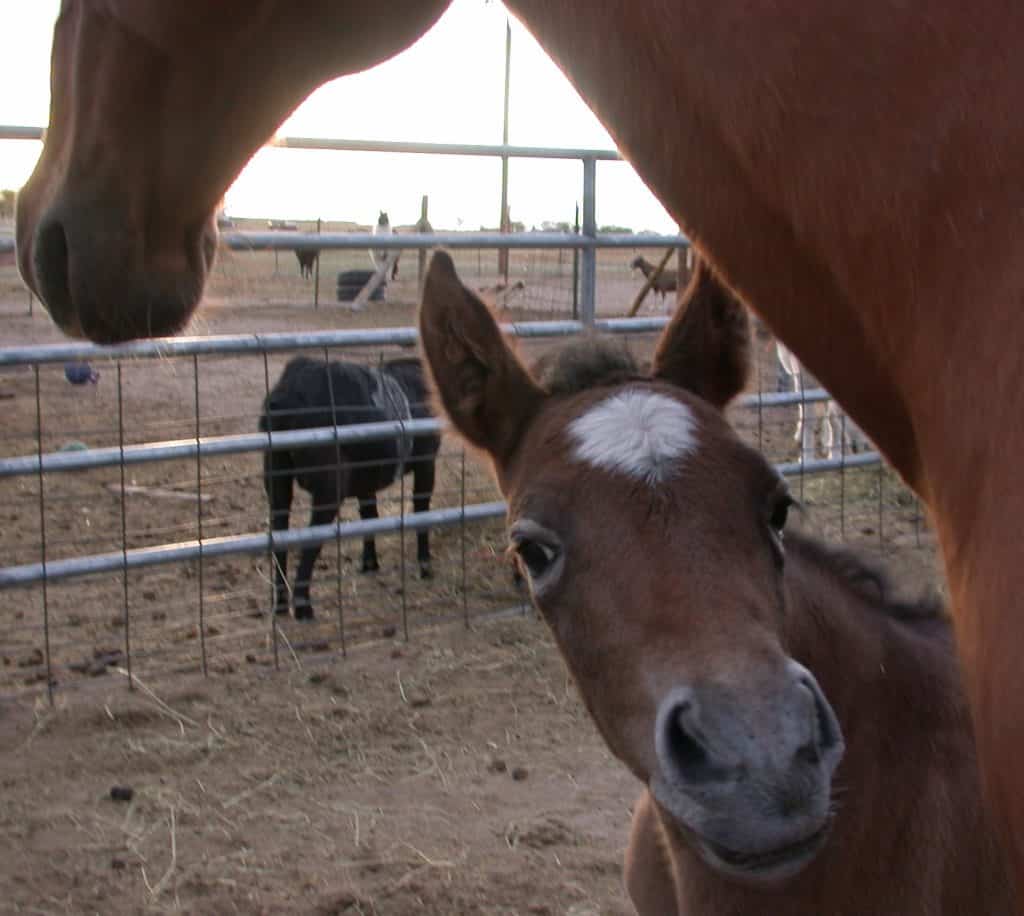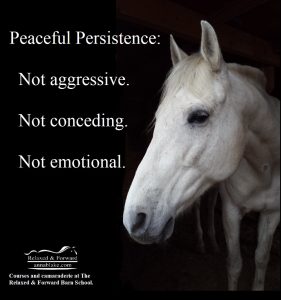
I saw a video this week that I can’t get out of my head. It lacked the drama of the usual train wrecks played for humor on social media. It was as slow and quiet as a PBS documentary. It was almost like we were peeping at the horse from a thousand yards. He felt that safe.
I’m old enough to remember the days when the only opportunity to get a video of your horse was at a show if there was a photographer to hire. Technology, especially digital photography, is a miracle. Instant replays aren’t always flattering, but they help us catch up on what we missed while we were distracted. Besides, we learn in hindsight, just like horses.
The video was posted in one of the classes I teach at The Barn School. I give homework and the participants post videos each week. This was a recording of a massive draft horse cross. He’s got feathers not quite long enough to hide his huge hooves, every inch of him is round, and his face isn’t exactly chiseled. Don’t get me wrong, he is a devilishly handsome horse, intelligent and quietly thoughtful. He’s just someone you would never confuse with an Arabian. It was windy and miserable outside, so his owner decided to let him sniff his way down the barn aisle. Call it enrichment. Call it true liberty work.
He checked the hay cart while he pondered the situation for a moment, giving a small calming signal. Was he really loose? Then he sniffed things on the ground, sinking his nose into corners while stretching his back. Almost timid, he carefully moved a box fan a few inches with his muzzle. He was delicate. Things on the wall caught his eye, and he gently ran his nose over them, in no hurry. Then he licked and chewed and thought about things some more, but with extremely polite introspection.
The video continued, but I was stuck, reminded of all the times when I was younger and would not let my horse smell anything. Leading was serious business and horses were to be constantly under control. We were taught that horses had to pay attention, and it was a sign of disrespect if they didn’t lead like… well, a brain-dead zombie. We impatiently snapped the rope, so horses would not lollygag because it was all about the rules. Besides, their behavior was a reflection of us. Then, we had the audacity to call it a partnership because we loved them.
If a horse did reach for a scrap of hay on the ground, we hurried to correct them before they did anything worse. We thought we were helpful. What if he nudged an empty bucket, and the world came apart at the horror? So, we raced up and grabbed the horse, which likely spooked them enough to tip over the bucket. Proud that we’d saved the day, but all we’d done was correct the poor horse for being curious. We micromanage horses because we don’t trust them. It has to be soul-killing, like yelling at a child if they reach for a toy.
It matters because curiosity is the opposite of fear.
Now, think of the foals you’ve seen. With wobbly knees and twitching noses, they are wildly curious about their environment, fascinated with cats and water and grass. They are learning at light speed. Not born helpless like us, they hit the ground bucking and cantering. Under the watchful eye of the mares, foals gamble and cavort, racing back when they get a fright. The mares don’t coddle them, and soon the foals are off again, braver this time. Left to their play, their curiosity turns into silly teenage bravado and eventually, bold mature confidence. Curiosity indicates mental health.
But horses who live in pens are different. We halter and control them in the first week, pulling on their faces or pushing them off balance to lead them. Too often youngsters are started with fear-based training methods, becoming shut down by our micromanaging and over-correcting. We still love them and are doing the very best we know how, but we end up squelching their curiosity because it’s inconvenient for us. Thinking we have to train a horse to focus when their senses are already sharper than ours. Thinking we have to teach them about the world when we only dumb them down. The only thing of value we could give horses is confidence. But if we correct them before they make a mistake, we’re training them to not think. The other words for that are learned helplessness.
I’m not saying don’t work with youngsters, just lighten up a bit. The old campaigners need it even more. Horses are inquisitive by nature, and the best training engages a horse’s mind as well as their body. We should focus on possibility instead of resistance. Mental health instead of blind obedience.
I’ve been lucky. My first horses were impervious to my perfectionist tendencies. Unwilling to bow to my fussiness and deaf to my self-important dreams. I had to grow up early in my horse life. Inconceivably, I listened, trying to figure out what I did wrong, and became interested in watching them figure things out for themselves. I certainly wasn’t perfect, but eventually I kept my hands quiet, and those same horses began offering me more than I asked for. Their answers were usually better than mine. I stopped thinking I had to train their answer and instead, I trusted their intelligence. Training became less of a perp walk and there were even moments of brilliance. Soon, I couldn’t tell who was training who, but it was something closer to a partnership.
So, I watched that “dull” video a few times, enjoying the gelding thinking for himself and finding his confidence. People tell me I’m patient with horses but that’s not it at all. I’m fascinated, spellbound by minute changes in their body, and breathing with every calming signal. Mostly, I’m curious about what they’ll do next.
 …
…
Relaxed and Forward Training by Anna Blake is no longer on Facebook because of repeated hacking. If you or your horse appreciate my writing, please share, subscribe to this blog, or join us at The Barn School.
 The Barn School, is a social and educational site, along with member sharing and our infamous Happy Hour. Anna teaches courses like Calming Signals and Affirmative Training. Everyone’s welcome.
The Barn School, is a social and educational site, along with member sharing and our infamous Happy Hour. Anna teaches courses like Calming Signals and Affirmative Training. Everyone’s welcome.
Want more? Become a sustaining member, a “Barnie.” Subscribe to our online training group with affirmative demonstration videos, audio blogs, daily quotes, free participation in “group lessons”, and live chats with Anna. Become part of the most supportive group of like-minded horsepeople anywhere.
Visit annablake.com to find archived blogs, purchase signed books, schedule a live consultation, subscribe for email delivery of this blog, or ask a question about the art and science of working with horses.
Ride for a new brand, find our Relaxed and Forward swag at Zazzle.
Affirmative training is the fine art of saying yes.
…
Splendid “capturing” of such core and key observations. Realities.
Thank you – you inspire confidence in me, as I read about your perceptions about allowing confidence to build in equines. Universal sort of message, Anna. Thank you.
Thanks, Mimi. And if your dogs are like mine, we do this a lot!
As is often the case, what you write applies to so much more than horses, which is its gift. Allowing, fill in the blank (kids, dogs, partners),.time to be curious. This is how we build real relationships and real intelligence. Curiosity is everything.
Thanks, Julie. My dog may have dictated this. Kids even more so. I won’t touch the topic of men and women.
I used to just sit on the grass in the 10 acre polo field when the herd where I took lessons were turned out to ride. I could sit for hours just watching the interactions between the horses and loving when individuals would come over and check in with me.
My current “herd” of three elders are all but feral. One in his very late sundown days, the other two in their early twenties, it is their lot in life to keep the grass trimmed, look gorgeous and soothe my soul.
Thanks, Shelley. A sweet retirement.
Love this! Our Appaloosa came to us, eleven years ago, as a complete zombie when handled by humans (more of a character when turned out). He wasn’t even allowed to put down his own hoof once picked out; he had to allow the human to place it for him. It took us a while to get him comfortable to release the habit of being a robot around us, but soon enough the real character within came out and he is the most curious, nosiest fellow of all! Everything around gets nosed, pushed, picked up, etc. Life is SO much more fun when they have the freedom to express themselves and explore the world around them – for them and for us!
that is so lovely Lia. Sad that he was turned into a zombie but wonderful that he met you!
Oh hurray, Lia. Appaloosas especially!!
Excellent essay and I couldn’t agree more. I too, was taught by a gelding unwilling to curb his curiosities to my structured way of order. Today, he and I enjoy a deep relationship where he is comfortable showing me things and asking for he wants, yet still trusts my decisions and obeys even if my request differs from his own opinion. There’s nothing I love more than being stopped in my tracks, headed towards my intention, only to be veered onto another course by his suggestions. I appreciate his willingness to engage in me in this way, and am thankful for the lessons he teaches.
Sounds like a partnership with two voices. Thanks Christine.
I so appreciate this week’s topic, Anna. During training or not, I always enjoy watching a horse demonstrate his/her curiosity.
Me, too. Just in from a lesson with a mare who thought I was a big slow. Thanks Lynell
How beautiful as ever Anna. Why do humans have to control everything? I always walked my horse in hand the last 1-2 miles of all our rides, letting him sniff around and munch the hedgerows. People I met thought once of us was injured or that I was mad! I let him be curious as I rode too and he was completely unconcerned by anything we met. The only thing he hated was having a bit in his mouth because he was a rescue who had been abused before I got him. So I rode him in a halter and he was barefoot as a farrier had scared him when he had laminitis (my ignorance as the grass was too rich for him). I loved having him and haven’t quite got over the fact that he is dead. I hope he enjoyed his years with me and his little herd. ❤️
I know he did. Thanks, Charlotte.
A great example of curiosity fostering confidence, resilience and possibilities.
Thank you for these magical written words that inspire me to facilitate more opportunities for curiosity
Thanks, Holly
I love this! I am fascinated watching our older horses as they question if it’s OK to risk checking something out. Often they will turn and look at me as if to say “can I do this???” The other day it took a full 15 minutes for one of our rescue mares to figure out that She could move out with me leading from behind! It was like I could almost read her mind asking herself if she would be safe voicing her opinion! What a rush it was to see her take that first bold step.
It’s a big deal…so glad for her. Thanks Ron.
This one will go down as one of my favorites. And if horses could choose their favs, I’d bet it would rank towards the top. Thank you Anna, for shining light where some never realized light was needed.
Thanks Sueann. This is one of those things we’ve been wrong about, but Science is clear.
BABY HORSE!!! What did you say?
But seriously, it’s a good one. Thanks, Anna!
Aren’t they the best? Thanks, Linda
Lovely piece of writing and some important thoughts.
Thank you, Eve.
Thank you 🙏😊
Thanks for reading, Kat
I remember when I moved my first horse from a confined stall environment to a friend’s open barn. My mare became curious of all the stalls, wandering into the tack and peeking into the feed room as we fed the horses. My friend talked to the horses knowing they completely understood her. I was AMAZED!! For the first time I realized not only that my horse had curiosity but immense intelligence and depth as she explored her new home. My relationship with my mare and all my other horses since completely changed as they have the freedom to show me who they really are. Gratefully they now all live with me and are free to be the magical beings they are. And yes, I do converse with them!
Thanks, Lynn. We used to think stalls were convenient… So glad we do less of that now.
This week’s essay ranks in my top 10 from you. I enjoyed the draft horse’s walk down the barn aisle; I could see all that so clearly. Well-written ! But I am especially appreciative of the message to readers to understand how harmful the micromanagement and punishment of curiosity can be. It’s so interesting how we horse people understand to some degree a horse’s instincts and yet expect them to just put all those instincts aside and listen only to us.
I do a lot better these days with my horses due to your teachings but I can still fall into MY old instinctual behaviors at times.
I think we all hear those old voices, and the thing about curiosity is all brain science, newer knowledge… but we are doing better. That’s what counts. Thanks Sarah
That was wonderful. Perfect timing!
Thanks, Tracie.